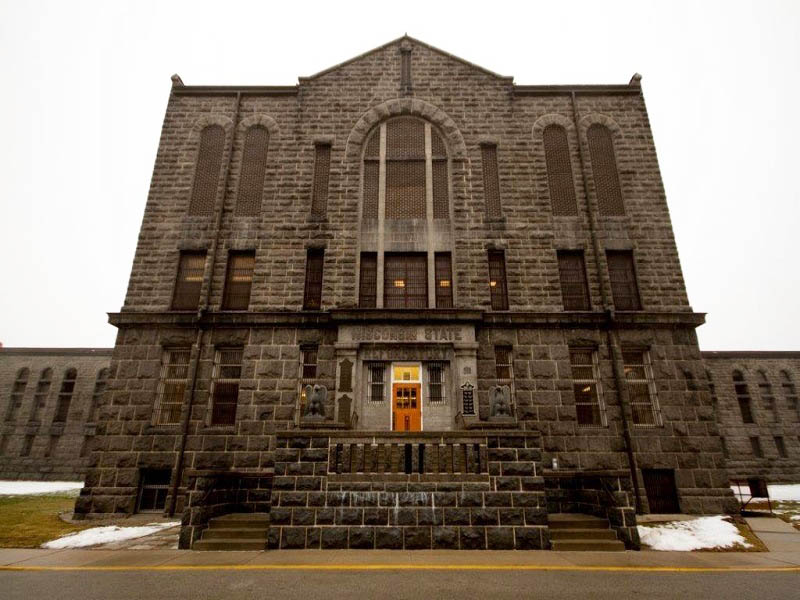Milwaukee Prison Activists Joining Nationwide Actions
"Shut' em Down" actions aim to shine light on conditions of prison system.
Prison abolitionist activists in Wisconsin are joining others across the country in a series of actions to shine a light on conditions inside prisons and jails across the country. The actions, collectively called Shut’em Down 2021, range from community discussion events to protests outside state incarceration facilities.
Wisconsin’s actions involve members of a variety of organizations, with activists from Abolish MKE at the forefront. On September 9, the group is planning a Day of Visibility outside the Milwaukee Secure Detention Facility (MSDF). The event is billed as an afternoon and evening celebration to bring attention to the plight of incarcerated people. Leading up to the Day of Visibility there will be a virtual letter writing campaign on September 5, and a screening of George Jackson: Death of a Revolutionary (1971) and Attica (1974) on September 4. Organizers hope these events will build solidarity leading into larger campaigns next year.
As of Aug 27, GBCI housed 902 incarcerated people. While that’s down from the 1,075 people who were incarcerated there on Aug. 30 of 2019 the prison, built for just 749, is still over-crowded. Abolish MKE demonstrated outside the complex’s tall cracked and degraded concrete walls and watch towers. The prison abolitionists were joined by activists from the Party for Socialism and Liberation (PSL), formerly incarcerated people, and others.
Ben Turk, an activist with Abolish MKE, highlighted several problems with the prison during the protest, including the condition of the 123-year-old facility itself and the stories which he and others routinely hear coming out of Green Bay CI and other prisons. “That includes the solitary confinement torture chamber,” said Turk over a loudspeaker, “the restrictive housing unit. We know all kinds of terrible [explicit] happens in that building. And we’re hoping that people who are held inside there can hear us.”
Rally-goers chanted, “You are not forgotten, you are not alone, we are going to fight to bring you home,” played music, and used noise-making devices to make their presence known. Some in the crowd were just supportive activists, others had either been in GBCI or had loved ones there. One woman tearfully explained that a loved one of hers was currently in solitary confinement.
Few had been closer to the issue than Segdrick Farley, 33, formerly incarcerated at GBCI. He first went there at the age of 20. “When I arrived at Green Bay, it had the reputation of being gladiator school,” said Farley. “We’re sending you to gladiator school.”
Other people Farley was incarcerated with told him to cover his window and tell the authorities they had to come into the cell. Although Farley didn’t want to, and knew he could be hurt or punished further, he also knew he didn’t have other options. “So I got a gang of people in all black outside my cell with mace,” he said, “and all of this is over a roll of toilet paper. You hear me? So being nice and polite didn’t get me that.”
Segregation wears on the mind. “Never mind this bright light that never goes off,” Farley explained, describing the inside of the cell. “Can’t cover up or anything. Some days on shower days I didn’t have underwear. They didn’t have clean underwear. You’re not even providing the inmates with decent clean clothes or the necessities that you need.” While on segregation Farley was unable to get visits, or call his family. Farley emphasized that although he broke the law, “I don’t come to prison to be further victimized. There are things that led up to me being incarcerated that need to get addressed, that wasn’t getting addressed. So violence gets perpetuated because hey, you’re in gladiator school.”
Following his time in the hole Farley was unable to even be hugged by his mother without jumping. “I jumped, I wasn’t used to human contact,” said Farley. “You hear me? I forgot what human contact was. It scared me. So here I was depressed, PTSD from all the beatings I took up on that hill for minor infractions.” He added that, “I lost friends in there who said, ‘I’m feeling suicidal I need to talk somebody,’…Are you hearing me? These [prison officials] are people that are hired and paid by your tax dollars.”
Turk also pointed to reports he’d heard after a 2016 hunger strike among incarcerated people at the facility. The strike started at the Waupun Correctional Institution, and spread to other facilities. “Within 10 days they started forcing people,” said Turk. Activists rallied to offer support outside the Waupun prison. “Force-feeding is a form of torture,” said Turk. “It’s incredibly painful, and it’s dangerous.”
Abolish MKE arrived at Green Bay’s prison with a list of demands as well. “We also know that these problems are fundamental to the operation of an overcrowded , understaffed, and deteriorating prison,” said Abolish MKE activist and formerly incarcerated person Tai Renfrow, reading from a demand letter written by the group. “GBCI is at 119% over-capacity as of last Friday. Before COVID, it was at 144% over-capacity. GBCI buildings are also falling apart. Most people, Republicans, Democrats, prisoner advocates, and guards, all agree that it should close down. Building a new prison is not the answer. That will cost over $1 billion and doesn’t solve the fact that not enough people want to work for the DOC.”
Renfrow invited any DOC wardens and staff to also join these calls to action. “We must reduce Wisconsin’s prison population,” she declared. “So we’re demanding that all DOC employees make a public request to Gov. Tony Evers. Tell him to expand his pardoning criteria so that some of the people can go home. Tell him to change his revocation policies so fewer people are incarcerated for technical violations of supervision rules. These are actions the governor could take now to prevent further deaths.”
She added, “P.S., Jailhouse Lawyers Speak, the nationwide organization that sparked today’s solidarity action is calling for civil disobedience and protests inside the prisons this time next year. The problems at GBCI and across the Wisconsin prison system will be solved. The humanitarian crisis must end. If the governor and DOC administrators continue their inaction, then their captives will address the problems themselves. And we will be here to defend them.”
Abolish MKE organizers then hand-delivered the demand letter to guards at the prison’s front door.
Prison abolition activists join nationwide actions was originally published by the Wisconsin Examiner.






















